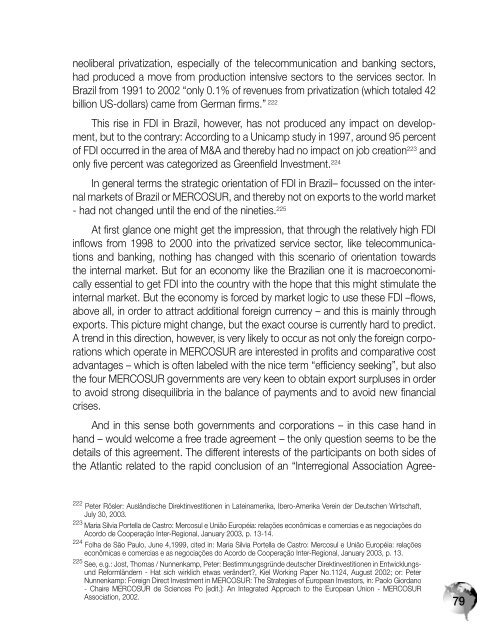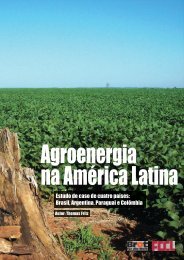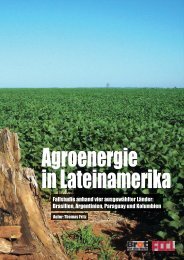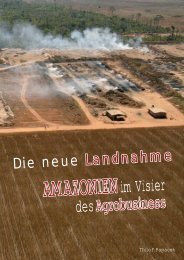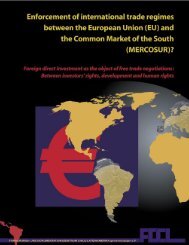Download - FDCL
Download - FDCL
Download - FDCL
You also want an ePaper? Increase the reach of your titles
YUMPU automatically turns print PDFs into web optimized ePapers that Google loves.
neoliberal privatization, especially of the telecommunication and banking sectors,<br />
had produced a move from production intensive sectors to the services sector. In<br />
Brazil from 1991 to 2002 “only 0.1% of revenues from privatization (which totaled 42<br />
billion US-dollars) came from German firms.” 222<br />
This rise in FDI in Brazil, however, has not produced any impact on development,<br />
but to the contrary: According to a Unicamp study in 1997, around 95 percent<br />
of FDI occurred in the area of M&A and thereby had no impact on job creation 223 and<br />
only five percent was categorized as Greenfield Investment. 224<br />
In general terms the strategic orientation of FDI in Brazil– focussed on the internal<br />
markets of Brazil or MERCOSUR, and thereby not on exports to the world market<br />
- had not changed until the end of the nineties. 225<br />
At first glance one might get the impression, that through the relatively high FDI<br />
inflows from 1998 to 2000 into the privatized service sector, like telecommunications<br />
and banking, nothing has changed with this scenario of orientation towards<br />
the internal market. But for an economy like the Brazilian one it is macroeconomically<br />
essential to get FDI into the country with the hope that this might stimulate the<br />
internal market. But the economy is forced by market logic to use these FDI –flows,<br />
above all, in order to attract additional foreign currency – and this is mainly through<br />
exports. This picture might change, but the exact course is currently hard to predict.<br />
A trend in this direction, however, is very likely to occur as not only the foreign corporations<br />
which operate in MERCOSUR are interested in profits and comparative cost<br />
advantages – which is often labeled with the nice term “efficiency seeking”, but also<br />
the four MERCOSUR governments are very keen to obtain export surpluses in order<br />
to avoid strong disequilibria in the balance of payments and to avoid new financial<br />
crises.<br />
And in this sense both governments and corporations – in this case hand in<br />
hand – would welcome a free trade agreement – the only question seems to be the<br />
details of this agreement. The different interests of the participants on both sides of<br />
the Atlantic related to the rapid conclusion of an “Interregional Association Agree-<br />
222<br />
Peter Rösler: Ausländische Direktinvestitionen in Lateinamerika, Ibero-Amerika Verein der Deutschen Wirtschaft,<br />
July 30, 2003.<br />
223<br />
Maria Silvia Portella de Castro: Mercosul e União Européia: relações econômicas e comercias e as negociações do<br />
Acordo de Cooperação Inter-Regional, January 2003, p. 13-14.<br />
224<br />
Folha de São Paulo, June 4,1999, cited in: Maria Silvia Portella de Castro: Mercosul e União Européia: relações<br />
econômicas e comercias e as negociações do Acordo de Cooperação Inter-Regional, January 2003, p. 13.<br />
225<br />
See, e.g.: Jost, Thomas / Nunnenkamp, Peter: Bestimmungsgründe deutscher Direktinvestitionen in Entwicklungsund<br />
Reformländern - Hat sich wirklich etwas verändert?, Kiel Working Paper No.1124, August 2002; or: Peter<br />
Nunnenkamp: Foreign Direct Investment in MERCOSUR: The Strategies of European Investors, in: Paolo Giordano<br />
- Chaire MERCOSUR de Sciences Po [edit.]: An Integrated Approach to the European Union - MERCOSUR<br />
Association, 2002.<br />
79


